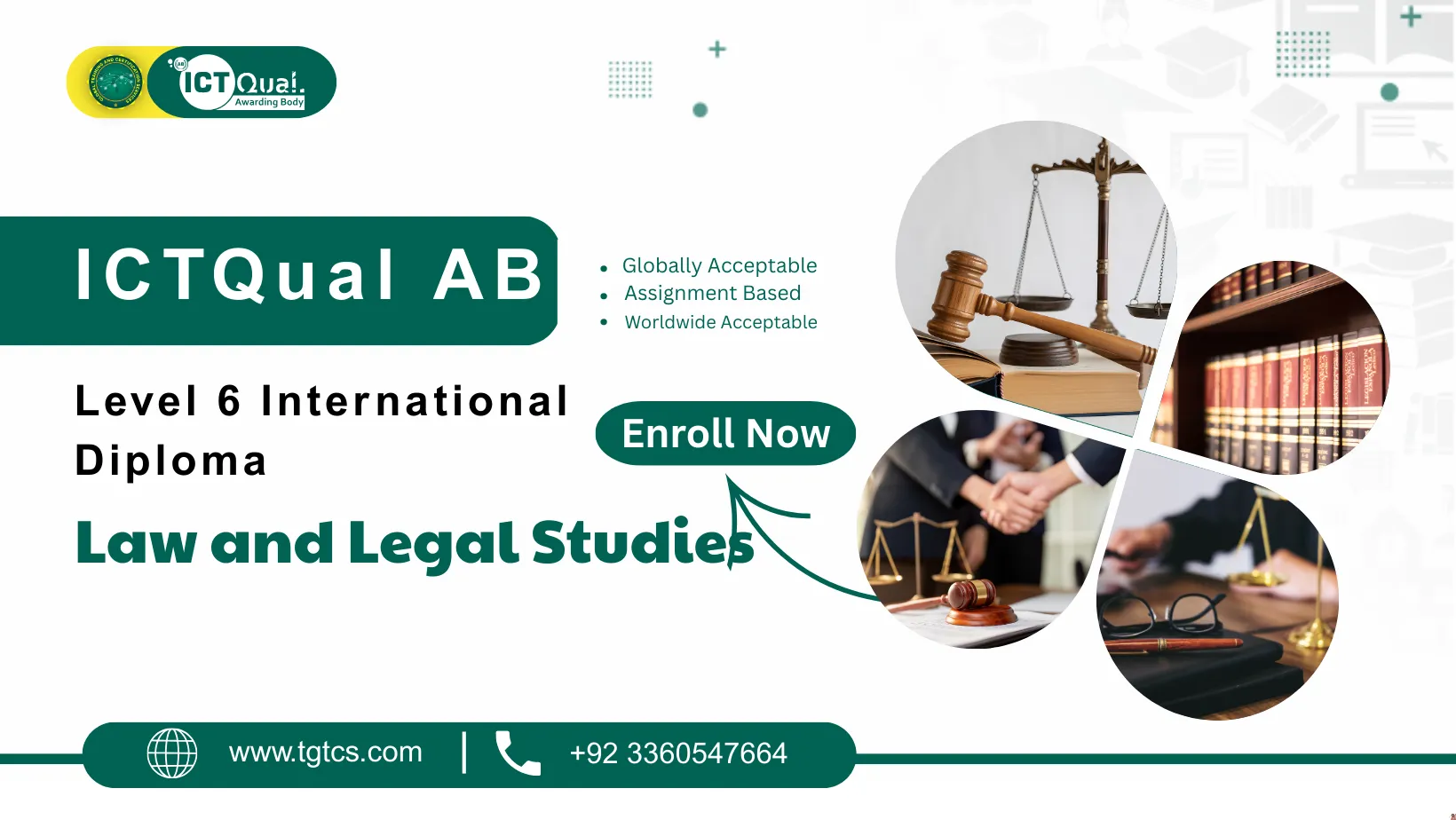ICTQual AB Level 6 International Diploma in Law and Legal Studies
The ICTQual AB Level 6 International Diploma in Law and Legal Studies is a globally recognized program designed to provide learners with advanced knowledge, critical skills, and professional expertise in the dynamic field of law. In today’s interconnected world, legal studies are not only vital for aspiring lawyers and legal professionals but also essential for leaders, policymakers, and business executives seeking to navigate complex legal frameworks across international jurisdictions.
This international diploma in law and legal studies offers a comprehensive exploration of core legal principles, international law, comparative legal systems, and the application of legal theory to real-world issues. Learners will develop advanced competencies in legal research, case analysis, contract law, criminal law, constitutional law, and dispute resolution while gaining practical insights into emerging global legal challenges.
The purpose of the ICTQual AB Level 6 Diploma in Law and Legal Studies is to equip learners with the ability to think critically, argue persuasively, and apply legal reasoning in diverse contexts. Through rigorous academic study and practical application, participants will build the confidence and expertise needed for careers in legal practice, public administration, diplomacy, and corporate governance.
Graduates of this program will be well-prepared for professional advancement or further academic progression in specialized fields of law. By bridging theory and practice, this diploma empowers learners to play an influential role in shaping fair, just, and effective legal systems worldwide.Whether your ambition is to pursue a career in law, enhance your legal knowledge for professional growth, or contribute to international policy and justice, the ICTQual AB Level 6 International Diploma in Law and Legal Studies provides the ideal pathway.
The Global Training and Certification Services is Approved Training Centre of ICTQual AB UK Ltd
Course Level and Credits
- Level 6 International Diploma, 360 credits.
- Suitable for fresh learners and experienced professionals seeking advanced legal knowledge and global recognition.
Mode of Study
- Fully assignment-based; learn at your own pace.
- Accessible worldwide, designed for flexible and independent learning.
Global Recognition & Attestation
- British Council verifiable, MOFA and Embassy attested.
- Recognized for career advancement, job opportunities, and iqama approval in Gulf countries.
Scope and Purpose
- Comprehensive coverage of core legal principles, international law, constitutional law, and dispute resolution.
- Focus on critical thinking, case analysis, and application of legal theory to real-world challenges.
Skills and Knowledge Gained
- Legal research, case study evaluation, contract law, criminal law, and comparative legal systems.
- Persuasive communication, legal reasoning, and professional decision-making skills.
Career Benefits
- Opens opportunities in legal practice, government institutions, corporate governance, and international organizations.
- Enhances professional credibility and employability in legal and regulatory sectors.
Target Audience
- Fresh students aiming to build a career in law and legal studies.
- Experienced professionals seeking recognition of prior experience and global certification.
Unique Selling Points (USPs)
- Flexible, self-paced, and fully assignment-based study model.
- Option for experienced professionals with 6+ years of verifiable experience to fast-track via professional discussions with an ICTQual AB Approved Assessor.
- Prestigious and globally recognized Level 6 diploma, ideal for employment, professional growth, and iqama approval.
Mandatory Unit
This qualification, the ICTQual AB Level 6 International Diploma in Law & Legal Studies, consists of 36 mandatory units.
Year 1 – Foundation in Political Science & International Relations
- Introduction to Political Science
- Foundations of International Relations
- Comparative Politics and Government Systems
- Political Ideologies and Theories
- History of Political Thought
- Principles of Public Administration
- Introduction to International Organisations
- Global History and World Politics
- Political Communication and Media Studies
- Research Methods in Political Science
- Human Rights and Social Justice
- Introduction to Diplomacy and Foreign Policy
Year 2 – Intermediate Political Science & International Relations
- Advanced Political Theory and Analysis
- International Law and Global Governance
- Political Economy and Development Studies
- Regional Studies: Europe, Asia, Africa, and the Middle East
- Conflict Resolution and Peace Studies
- Political Sociology and Social Movements
- Policy-Making and Public Policy Analysis
- International Political Economy
- Comparative Foreign Policy
- Security Studies and Global Challenges
- Research Methods and Data Analysis in Politics
- Ethics and Professional Practice in Political Science
Year 3 – Advanced Political Science & International Relations
- Contemporary Issues in International Relations
- Strategic Studies and National Security
- International Diplomacy and Negotiation
- Policy Analysis and Political Reform
- Globalisation and Transnational Politics
- Leadership and Governance in Political Institutions
- International Conflict and Crisis Management
- Political Risk Analysis and Strategic Decision-Making
- Environmental Politics and Global Sustainability
- International Cooperation and Development Projects
- Innovation and Emerging Trends in Global Politics
- Capstone Project in Political Science & International Relations
The ICTQual AB Level 6 International Diploma in Law and Legal Studies is designed to equip learners with advanced academic knowledge, professional legal skills, and practical competencies in political science, international relations, and global governance.
Year 1 – Foundation in Political Science & International Relations
Introduction to Political Science
- Understand the scope, nature, and significance of political science as a discipline.
- Identify the relationship between politics, law, and governance in modern societies.
- Analyze the roles of institutions, governments, and political actors.
- Apply fundamental concepts to contemporary political and legal systems.
Foundations of International Relations
- Explain the evolution and significance of international relations in global affairs.
- Evaluate theories of realism, liberalism, and constructivism in global politics.
- Assess the impact of state and non-state actors in international systems.
- Explore the role of international law in shaping diplomatic relations.
Comparative Politics and Government Systems
- Examine different political and legal systems across nations.
- Analyze comparative approaches to democracy, authoritarianism, and hybrid regimes.
- Understand the constitutional structures and governance mechanisms worldwide.
- Apply comparative methods to assess political and legal outcomes.
Political Ideologies and Theories
- Identify and explain major political ideologies such as liberalism, socialism, and conservatism.
- Evaluate the influence of ideologies on law, governance, and policy-making.
- Examine how political theories shape national and international legal frameworks.
- Apply theoretical perspectives to contemporary political challenges.
History of Political Thought
- Trace the development of political thought from classical to modern times.
- Evaluate contributions of key thinkers such as Plato, Aristotle, Hobbes, Locke, and Marx.
- Analyze the link between political theory and legal principles.
- Assess the relevance of historical political ideas in today’s legal and political contexts.
Principles of Public Administration
- Understand the foundations of public administration and governance.
- Explore the relationship between administration, law, and public service delivery.
- Examine theories and models of bureaucratic and administrative systems.
- Apply principles of accountability and ethics in public administration.
Introduction to International Organisations
- Identify the structure and functions of major international organizations.
- Analyze the role of the UN, WTO, IMF, and other legal-political bodies.
- Understand the relationship between international organizations and international law.
- Evaluate the impact of global institutions on peace, security, and governance.
Global History and World Politics
- Trace key historical events that shaped global political and legal systems.
- Examine the impact of colonization, wars, and revolutions on international law.
- Understand the historical development of diplomacy and foreign relations.
- Relate historical events to modern global governance structures.
Political Communication and Media Studies
- Explore the role of media in shaping political opinion and legal awareness.
- Analyze communication strategies used in politics, governance, and law.
- Evaluate the impact of digital and social media on political participation.
- Apply principles of political communication in legal and political contexts.
Research Methods in Political Science
- Develop research skills specific to political and legal studies.
- Learn methods of qualitative and quantitative data collection.
- Apply research designs to study governance, law, and political behavior.
- Interpret and present findings in a professional and academic manner.
Human Rights and Social Justice
- Understand the foundations and principles of international human rights law.
- Examine social justice issues and their connection with legal frameworks.
- Evaluate human rights instruments, treaties, and enforcement mechanisms.
- Apply human rights principles to contemporary political and legal challenges.
Introduction to Diplomacy and Foreign Policy
- Define diplomacy and its significance in international relations.
- Analyze the elements of foreign policy formulation and execution.
- Evaluate the impact of diplomacy on legal agreements and global peace.
- Apply diplomatic strategies in hypothetical political and legal scenarios.
Year 2 – Intermediate Political Science & International Relations
Advanced Political Theory and Analysis
- Critically evaluate modern political theories and their legal implications.
- Apply theoretical models to contemporary governance and policymaking.
- Assess the relationship between political thought and constitutional frameworks.
- Compare analytical approaches to law, democracy, and justice.
International Law and Global Governance
- Understand the foundations and sources of international law.
- Examine the role of international law in regulating global governance.
- Analyze legal frameworks governing treaties, diplomacy, and conflict resolution.
- Evaluate the effectiveness of international courts and tribunals.
Political Economy and Development Studies
- Explore the relationship between politics, economics, and development.
- Assess the legal and institutional frameworks for sustainable development.
- Evaluate global trade policies and their political impact.
- Analyze governance challenges in economic and social reforms.
Regional Studies: Europe, Asia, Africa, and the Middle East
- Examine regional political and legal systems across continents.
- Analyze case studies of regional conflicts, cooperation, and governance.
- Compare the impact of regional organizations such as the EU, AU, and ASEAN.
- Apply regional perspectives to international relations and law.
Conflict Resolution and Peace Studies
- Understand the theories and practices of conflict resolution.
- Explore the role of international law in peacekeeping and conflict management.
- Assess negotiation and mediation strategies in conflict resolution.
- Apply peace studies frameworks to real-world case scenarios.
Political Sociology and Social Movements
- Analyze the relationship between law, politics, and social structures.
- Examine the role of social movements in shaping political change.
- Evaluate the legal frameworks governing protests, rights, and social justice.
- Apply sociological theories to contemporary political challenges.
Policy-Making and Public Policy Analysis
- Understand the stages of policy formulation and implementation.
- Evaluate the role of law and governance in policy-making.
- Assess the effectiveness of policies in addressing political and social issues.
- Apply analytical tools to measure policy outcomes.
International Political Economy
- Explore global trade systems, markets, and legal frameworks.
- Analyze the role of international institutions in regulating economic relations.
- Assess the impact of globalization on national economies and legal sovereignty.
- Apply theories of political economy to global governance challenges.
Comparative Foreign Policy
- Compare foreign policy strategies across major powers and regions.
- Evaluate the legal and institutional mechanisms behind foreign policy decisions.
- Understand the role of diplomacy, treaties, and international agreements.
- Apply comparative methods to analyze foreign policy outcomes.
Security Studies and Global Challenges
- Identify key concepts in security studies and international law.
- Examine global security threats, including terrorism, cybercrime, and WMDs.
- Evaluate international legal responses to global security challenges.
- Apply security theories to real-world international crises.
Research Methods and Data Analysis in Politics
- Develop advanced data collection and analysis skills.
- Apply statistical tools and qualitative methods to political research.
- Evaluate the reliability and validity of political and legal data.
- Present research findings with clarity and academic rigor.
Ethics and Professional Practice in Political Science
- Understand the role of ethics in political and legal professions.
- Examine codes of conduct and professional responsibilities.
- Assess ethical dilemmas in governance, law, and diplomacy.
- Apply ethical decision-making frameworks to practical case studies.
Year 3 – Advanced Political Science & International Relations
Contemporary Issues in International Relations
- Analyze current global challenges such as terrorism, migration, and climate change.
- Evaluate the role of international law in addressing contemporary issues.
- Examine the influence of global institutions in conflict and cooperation.
- Apply theoretical perspectives to modern international disputes.
Strategic Studies and National Security
- Understand core concepts of national defense and security strategies.
- Analyze the role of law and governance in shaping security policies.
- Evaluate military, economic, and diplomatic tools of national security.
- Apply strategic studies theories to real-world security challenges.
International Diplomacy and Negotiation
- Examine the principles and practices of diplomatic negotiations.
- Evaluate the role of treaties, agreements, and conventions in diplomacy.
- Assess negotiation strategies for conflict resolution and international cooperation.
- Apply diplomacy skills in simulated negotiation scenarios.
Policy Analysis and Political Reform
- Understand the frameworks for evaluating political and legal reforms.
- Assess the effectiveness of reform policies in governance systems.
- Examine the role of international law in political transitions.
- Apply analytical tools to case studies of political reforms.
Globalisation and Transnational Politics
- Explore the effects of globalization on sovereignty and governance.
- Evaluate the role of multinational corporations in law and politics.
- Analyze transnational issues such as migration, environment, and trade.
- Apply globalization theories to international political systems.
Leadership and Governance in Political Institutions
- Examine the principles of leadership in political and legal contexts.
- Assess governance models and their role in effective administration.
- Analyze case studies of leadership in global and national institutions.
- Apply leadership theories to political and legal decision-making.
International Conflict and Crisis Management
- Understand frameworks for managing international crises.
- Evaluate legal and diplomatic approaches to conflict resolution.
- Analyze historical and contemporary case studies of crisis management.
- Apply conflict management strategies to international disputes.
Political Risk Analysis and Strategic Decision-Making
- Identify risks affecting international politics and business environments.
- Evaluate the role of legal systems in managing political risk.
- Apply risk analysis models to political and security scenarios.
- Assess decision-making strategies in high-risk global contexts.
Environmental Politics and Global Sustainability
- Examine the role of international law in environmental protection.
- Analyze global treaties and agreements on climate change.
- Evaluate sustainable development policies and their political impact.
- Apply environmental governance frameworks to real-world challenges.
International Cooperation and Development Projects
- Understand the role of international organizations in development.
- Evaluate the legal frameworks governing aid, trade, and cooperation.
- Analyze the success and challenges of global development projects.
- Apply project management skills to international cooperation initiatives.
Innovation and Emerging Trends in Global Politics
- Explore new developments in global governance and diplomacy.
- Assess the impact of technology, AI, and cybersecurity on law and politics.
- Evaluate emerging trends such as digital diplomacy and smart governance.
- Apply innovative approaches to solving international political challenges.
Capstone Project in Political Science & International Relations
- Conduct independent research on a complex issue in law and politics.
- Apply theories, methodologies, and data analysis to a chosen topic.
- Present research findings in a professional and academic format.
- Demonstrate mastery of advanced legal and political knowledge.
The ICTQual AB Level 6 International Diploma in Law and Legal Studies offers learners advanced expertise, practical legal skills, and global recognition. This qualification opens doors to prestigious career paths in law, governance, policy-making, and international organizations, making it ideal for both fresh graduates and experienced professionals.
Advanced Legal Knowledge and Expertise
- Gain in-depth understanding of legal systems, political structures, and international law.
- Develop the ability to analyze complex legal frameworks and apply them in real-world contexts.
Practical Skills for Global Careers
- Enhance critical thinking, research, and analytical skills in legal and political studies.
- Build competencies in diplomacy, policy-making, negotiation, and legal interpretation.
Flexible and Accessible Learning
- Study fully assignment-based at your own pace, accessible worldwide.
- Ideal for working professionals balancing career and education.
International Recognition and Attestation
- British Council verifiable, MOFA and Embassy attested for global acceptance.
- Recognized for job opportunities, career advancement, and iqama approval in Gulf countries.
Career Advancement Opportunities
- Opens pathways to careers in law, governance, international organizations, and diplomacy.
- Strengthens employability and professional credibility in both local and international markets.
Suitable for Fresh and Experienced Learners
- Fresh students complete 36 mandatory assignments over 3 years.
- Experienced professionals may qualify through prior experience and professional discussions.
The ICTQual AB Level 6 International Diploma in Law and Legal Studies is more than a qualification—it is a gateway to global career success, professional growth, and recognition in the fields of law, governance, and international relations.
The ICTQual AB Level 6 International Diploma in Law and Legal Studies is designed for ambitious individuals aiming to strengthen their expertise in law, politics, and international governance.
Fresh Graduates and Students
- Gain comprehensive legal and political knowledge for a solid career start.
- Build academic credibility and open doors to higher studies or specialized legal training.
Legal and Governance Professionals
- Upgrade existing knowledge with advanced international law and policy skills.
- Enhance career opportunities in law firms, government, and international organizations.
Diplomats and Policy Makers
- Strengthen expertise in diplomacy, negotiation, and international law.
- Apply practical skills in policy-making, governance, and conflict resolution.
Career Changers and Aspiring Legal Experts
- Transition smoothly into the fields of law, legal studies, and governance.
- Acquire globally recognized certification to boost professional credibility.
Working Professionals Seeking Recognition
- Study flexibly at your own pace without disrupting career commitments.
- Benefit from British Council verification and global attestation for job approvals.
By offering flexibility, global recognition, and practical applications, the ICTQual AB Level 6 International Diploma in Law and Legal Studies ensures every learner is equipped for professional excellence and international career success.
Course Overview
Course Level
Level 6
Course Units
36 Units
Credits
360
Duration
3 years






